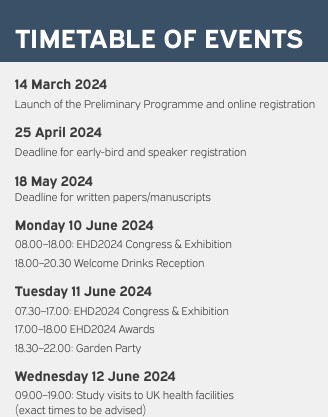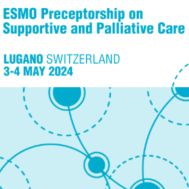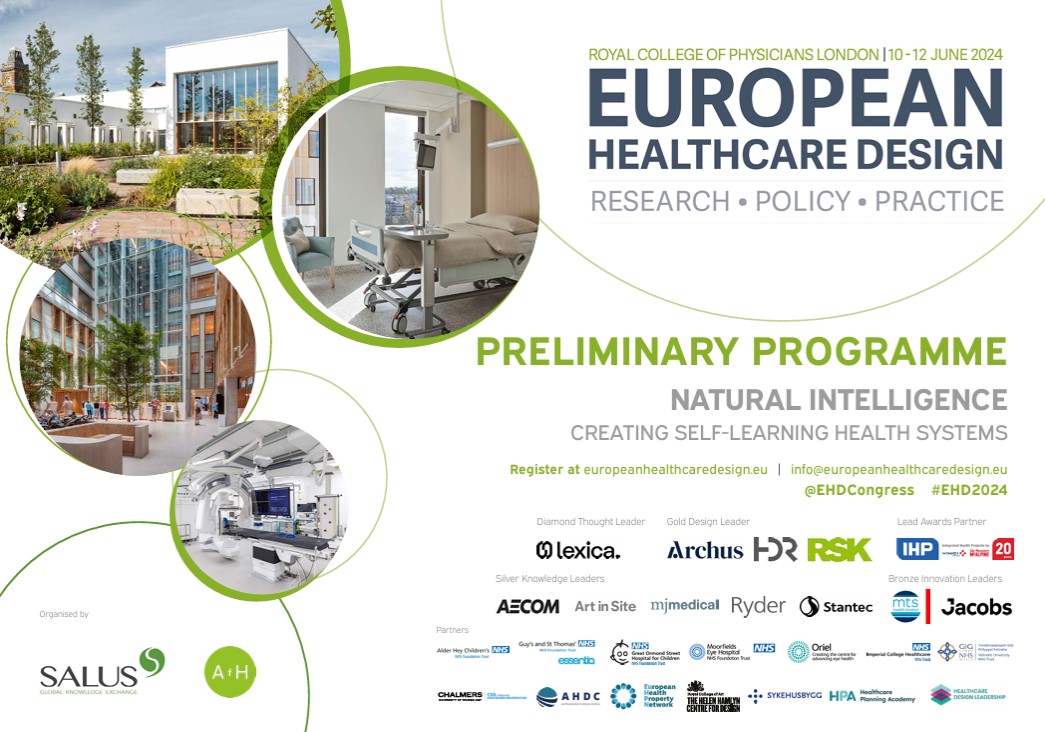EUROPEAN HEALTHCARE DESIGN 2024

Start
Mon, 10 Jun 2024, 09:00
End
Wed, 12 Jun 2024, 18:00
WebSite
Hashtag:
#EHD2024
Venue:
Exhibit
Symposia
Workshops
Organiser
Sponsor
NATURAL INTELLIGENCE CREATING SELF-LEARNING HEALTH SYSTEMS
Faced with the challenges of implementing climate-smart healthcare systems, delivering new service and asset models that strengthen resilience, and creating humanistic environments that promote wellbeing, how do we create self-learning health systems?
The most successful organisations also tend to be the best at learning. They are able to build collective intelligence, continuously refresh it, and make it readily accessible. Ideally, every action adds to existing pools of knowledge and skills, and learning becomes embedded in ways of thinking and doing. Conversely, we know that institutional amnesia is wasteful and costly, leading to unnecessary re-invention and repetition of past mistakes.
Celebrating a decade at the vanguard of professional development and bridging the gap between research, policy and practice, the 10th European Healthcare Design Congress will once again welcome the healthcare design community to gather, share insights and learn from one another: learning from practice, from history, from experiments, from accidents, from success – and perhaps, most importantly, from failure. At a time when everyone is talking about the need for system change, yet few are able to articulate the path to realising it, our proposition is that when real learning is embedded, systems naturally change for the better. Therefore, we invite stories of learning in healthcare, with examples of all scale and type, in ways of doing things organizationally, physically, clinically, and socially – seen through the lens of healthcare design.
Interconnectedness and artificial intelligence
As we approach the start of this century’s second quarter, two factors compel an increased focus on learning. Firstly, we’re now acutely aware of the interconnectedness of things. We now think of human beings as composed of billions of organisms, the health of which, or sometimes the lingering presence of which, is critical to general health. Intelligence, learning and communication are at the heart of understanding this interconnectedness.
The second factor is the rapidly evolving story of artificial intelligence. AI has been on the edge of debate in healthcare design for many years; for example, through its connection with enabling personalised medicine. Now, AI has embedded itself into our collective consciousness in a new way, with greater focus on both the risks and opportunities it presents for improving health outcomes.
One thing is certain – AI will not succumb to amnesia. But in healthcare, as well as more widely, can we deploy natural intelligence to be as good at learning and remembering? Do we need to rapidly develop better NI to deal with AI? Not to mention other areas in which learning is urgently needed to address colossal challenges – from delivering climate-smart healthcare systems and net-zero carbon strategies, to delivering new service models that promote quality improvement and strengthen health system resilience, to creating humanistic environments that promote wellbeing and accelerate recovery while supporting patient identity and dignity.
Some progressive healthcare systems are engaging in the meticulous collection and deployment of data to address specific health challenges through better design – a clear example at the micro scale. Meanwhile, at the larger scale, wide adoption of digital technology is throwing up examples of innovative capture of user behaviour to inform patient experience and journeys. One of the most established methods of learning in the built environment is post-occupancy evaluations (PoEs) – the systematic evaluation of a building’s performance after it has been occupied. However, while there is general agreement about the value of PoEs, the healthcare industry has been sluggish in adopting them as the norm. Should they become a more regular part of our arsenal in creating self-learning health systems?

REGISTRATION IS OPEN – EARLY-BIRD DEADLINE 25 APRIL
Registration for the 10th European Healthcare Design 2024 Congress, Exhibition and Awards is now open, with the Early Bird deadline on Thursday 25 April
A range of in-person and virtual-only tickets are available in three categories: Public Sector; Event Partner; and Commercial.
All tickets include lunch and 2 coffee breaks per day, entry to the Welcome reception on Monday 10 June and access to the mobile app and event platform, including recordings of all the video talks for two months after the event closes.
Delegate Discounts:
Public sector rate – eligible for any employee of a public sector (eg, government, public healthcare organisation or university) or third sector (charitable/non-profit/voluntary)
Event partner rate – eligible for any member of the following event partners: Architects for Health, Australian Health Design Council, New Zealand Health Design Council, Health Planning Academy, European Health Property Network and Healthcare Design Leadership.
Virtual group rate – Group discounts are available for virtual tickets ONLY.
A 10% discount is available if you’re booking 3 or more ‘virtual’ tickets, 15% if you’re 5 or more virtual tickets, and 25% if you’re booking 10 or more.
Please contact Krishna Mistry at [email protected] to apply for your virtual group discount before completing this online form.
Conference fees:
| In-person registration | |
Commercial rate: | |
| Early-bird rates (until 25 April): | 2-day ticket: £645 (£774 incl. VAT) 1-day ticket: £445 (£534 incl. VAT) |
| Standard rates (from 26 April): | 2-day ticket: £745 (£894 incl. VAT) 1-day ticket: £545 (£654 incl. VAT) |
| Public sector rate: | |
| Early-bird rates (until 25 April) | 2-day ticket: £495 (£594 incl. VAT) 1-day ticket: £325 (£390 incl. VAT) |
| Standard rates (from 26 April): | 2-day ticket: £595 (£714 incl. VAT) 1-day ticket: £425 (£510 incl. VAT) |
| Event partner rate: | |
| Early-bird rates (until 25 April): | 2-day ticket: £595 (£714 incl. VAT) 1-day ticket: £395 (£474 incl. VAT) |
Standard rates (from 26 April): | 2-day ticket: £695 (£834 incl. VAT) 1-day ticket: £495 (£594 incl. VAT) |
| Virtual registration: | |
| Single rate: | |
| Early-bird rates (until 25 April) | 2-day ticket: £175 (£210 incl. VAT) 1-day ticket: £95(£114 incl. VAT) |
| Standard rates (from 26 April): | 2-day ticket: £225 (£270 incl. VAT) 1-day ticket: £135 (£162 incl. VAT) |
Garden Party | £135(£162 incl. VAT) |
Includes BBQ, drinks and live music | |
| Study Tours | |
Study Tour 1 (Brighton): | £195 (£234 incl. VAT) |
Study Tour 2 (Bath): | £195 (£234 incl. VAT) |
Study Tour 3 (TBC): | TBC |
More events


Wed, 1 May 2024 - Fri, 3 May 2024

Thu, 2 May 2024 - Mon, 6 May 2024

Fri, 3 May 2024 - Sun, 5 May 2024

Fri, 3 May 2024 - Sat, 4 May 2024

Fri, 3 May 2024 - Sat, 4 May 2024


Sun, 5 May 2024 - Wed, 8 May 2024
Georgia, 30313
United States

Sun, 5 May 2024 - Tue, 7 May 2024

Mon, 6 May 2024 - Thu, 9 May 2024
















